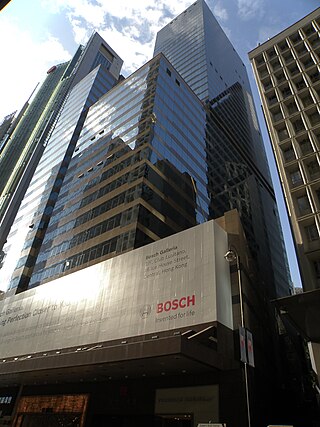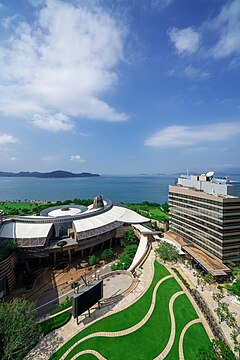
PCCW Limited is a Hong Kong–based information and communication technology (ICT) and telecommunications company.

The Southern District is one of the 18 districts of Hong Kong. It is located in the southern part of Hong Kong Island and the largest part of the island. It had a population of 274,994 in 2016.

The Hong Kong University of Science and Technology (HKUST) is a public research university in Sai Kung District,New Territories,Hong Kong. Founded in 1991,it was the territory's third institution to be granted university status,and the first university without any precursory existence upon its formation. It occupies a 60-hectare (150-acre) seaside site in Tai Po Tsai,Clear Water Bay Peninsula,and has established a satellite campus in Guangzhou,Guangdong,China.

Richard Li Tzar-kai is a Hong Kong businessman and philanthropist. The founder and chairman of the private investment group Pacific Century Group (PCG),Li started his career in the 1990s with the founding of STAR TV,a pan-Asian television network. After founding PCG in 1993,he went on to establish PCCW and HKT Trust.

New World Development Company Limited (NWD),is a Hong Kong–based company focused on property,hotels,infrastructure and services and department stores. It was established on 29 May 1970 by Cheng Yu-tung. The company is publicly listed on the Stock Exchange of Hong Kong Limited since 23 November 1972 and is a constituent stock of Hong Kong Hang Seng Index.
Pacific Century Group (PCG),chaired by Richard Li,is an Asia-based private investment group founded in 1993 with interests in technology,media and telecommunications,financial services,infrastructure,property and other investments. It operates mainly in the Asia-Pacific region,including Singapore,Hong Kong and Japan.

Sun Hung Kai Properties Limited (SHKP) is a listed corporation and one of the largest property developers in Hong Kong. The company's businesses include property sales,property rental,telecommunications,hotel operation,transport and logistics,and others. The company is controlled by the Kwok family trust,largely the Kwok brothers.

Hongkong Land (HKL) is a property investment,management and development group with commercial and residential property interests across Asia. It owns and manages some 850,000 sq. m. of office and retail property in Asia,principally in Hong Kong and Singapore. Its Hong Kong portfolio represents some 450,000 sq. m. of commercial property,making it the single largest landlord in Central,Hong Kong. In Singapore it has 165,000 sq. m. of office space mainly held through joint ventures. While its subsidiary MCL Land is a residential developer. Hongkong Land also has a 50 per cent interest in World Trade Center Jakarta,an office complex in Central Jakarta that it shares with the Murdaya family 's Central Cipta Murdaya Group and a number of residential and mixed-use projects under development in cities across Greater China and Southeast Asia - including WF CENTRAL,a luxury retail centre in Wangfujing,Beijing.

Invest Hong Kong is the department of the Hong Kong SAR Government responsible for Foreign Direct Investment,supporting overseas businesses to set up and expand in Hong Kong. Founded on 1 July 2000,its first Director General was Michael Rowse.

The Hong Kong Science and Technology Parks Corporation (HKSTP) is a public corporation set up by the Hong Kong Government in 2001 to foster innovation and technology development in Hong Kong.

David Michael Webb is an activist investor,share market analyst and retired investment banker based in Hong Kong.
The following is a non-exhaustive list of private housing estates in Sha Tin District,Hong Kong.

Innovation,Technology and Industry Bureau (ITIB) is a policy bureau of the Government of Hong Kong. It is responsible for policy matters on the development of innovation and technology and information technology which are the key drivers in this endeavour. The Bureau is led by the Secretary for Innovation,Technology and Industry,currently Dong Sun.
The history of the South Island line and West Island line encompasses a number of proposals which were made for extending the Hong Kong MTR metro system to the south and west of Hong Kong Island,which were not serviced by any rail transport before 2014. The West Island line opened as an extension of the Island line on 28 December 2014. The South Island line has completed construction and commenced service on 28 December 2016. The proposed South Island line (West) is still in the planning phase and is expected to begin in 2021.

The Lok Ma Chau Loop is a small piece of riverside land transferred to Hong Kong by mainland China on 3 January 2017. It is the proposed development site for the Hong Kong-Shenzhen Innovation and Technology Park.

Fintech Valley Vizag is an initiative of the Government of Andhra Pradesh to promote business infrastructure in the state,and attract investors and multinational corporations to set up offices. Fintech Valley was founded by N. Chandrababu Naidu then Chief Minister of the Andhra Pradesh state in December 2016 with the goal of enhancing Visakhapatnam City as a financial technology capital in Andhra Pradesh.

Christopher Hui Ching-yu is a Hong Kong politician and government official. Since 2020,he has been Secretary for Financial Services and the Treasury.

The Wireless Technology Industry Association (WTIA) is a non-profit trade association based in Hong Kong to promote the development,usage and awareness of wireless technology applications in Hong Kong;and to enhance communication and partnership between different types of companies in the wireless technology industry.

Johnny Ng Kit-chong,,is a Hong Kong politician. Ng has been actively involved in public service,having been a member of the National Committee of the Chinese People's Political Consultative Conference since 2018 and being elected as a member of the seventh Legislative Council in 2021,where he currently serves as one of Hong Kong's Legislative Councilors,elected from the Election Committee.

Environment and Ecology Bureau is a policy bureau of the Government of Hong Kong. The agency was established on 1 July 2022. The current Secretary for Environment and Ecology is Tse Chin-wan.


































